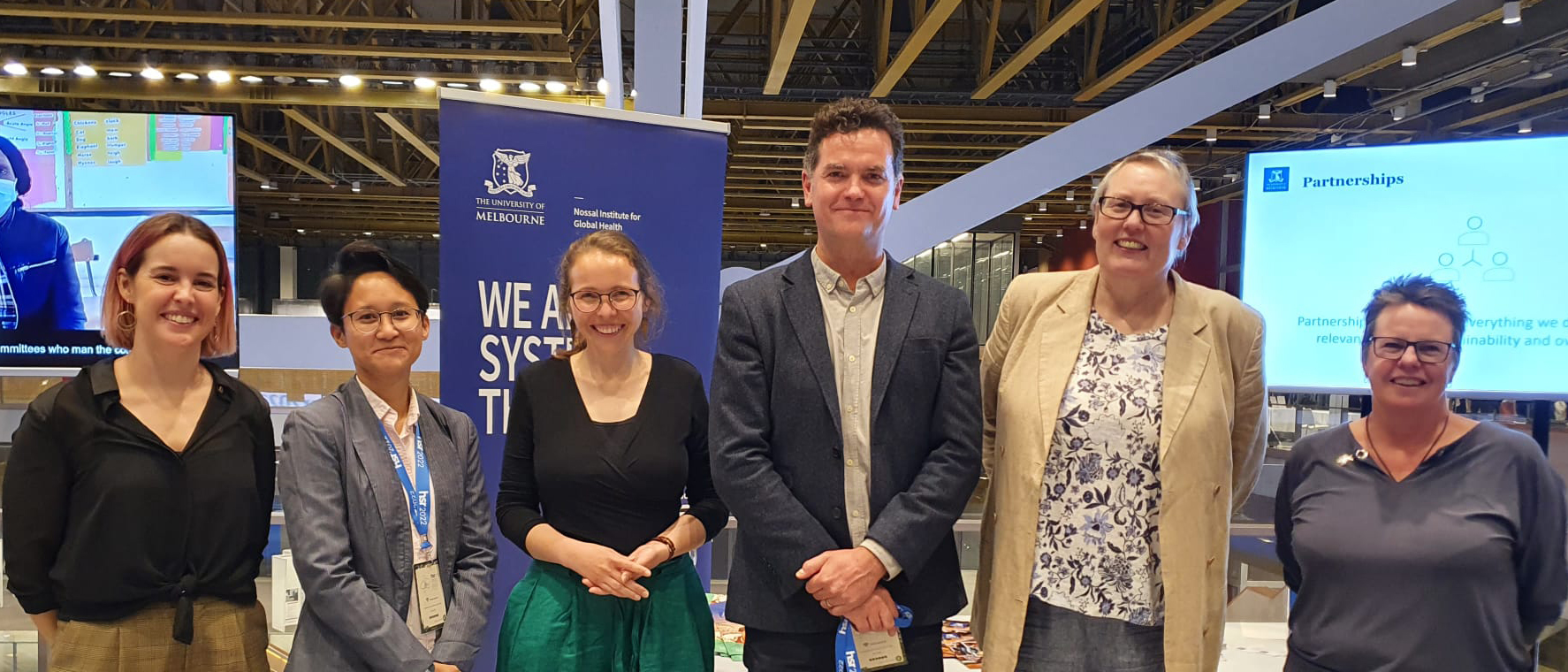Exploring the structural issues of health systems #HSR2022
For the first time in three years, we have been able to connect with our international colleagues at the Health Systems Research Conference. The conference, organised by the Health Systems Global Network and held in Bogota, Colombia, aimed to ‘explore how to deal with the structural issues that all health systems face’.
Nossal staff were able to present recent findings at multiple sessions.

Professor Barbara McPake, Nossal Director and out going HSG Chair, introduced the ReLAB-HS satellite breakfast and made a strong argument for the integration of rehabilitation into health systems as an appropriate response to the changes that we are seeing globally in terms of aging populations, changes to burden of disease, and increases in internal conflicts resulting in low level injuries that combatants are likely to survive, but with enduring impairments.
Katherine Dobson from the ReLAB -HS evaluation team gave a presentation on why we need a stronger, and shared understanding of what integration means in order to effectively implement and evaluate integration of rehabilitation.
Dr Daniel Strachan and Peter Annear facilitated a WHO sponsored discussion on challenges and opportunities for primary health care in the Western Pacific Region and Alison Mcintyre shared insights in the application of supportive supervision to improve the quality of primary health care. Kimberly Lakin gave a virtual session on her research into how health system respond to the expectations of migrant women. Dr Tiara Marthias presented on vaccine prioritization in Indonesia, Thailand and Vietnam. Our researchers also showcased the lessons learned from RESPONSE project research
The Conference attracts leading health systems researchers from around the world. As well as sharing our expert knowledge it was an opportunity to connect with and learn from our international colleagues. Highlights included:
- The Emerging Voices for Global Health Network, a vibrant network of early career researchers and activists who are learning and sharing together to promote underrepresented groups in the global health sector. With a focus on health justice through collective action, a systems thinking approach, and a willingness to admit and discuss mistakes, the network makes us believe the future of global health can be better for all of us.
- There is a strong push for community engagement in health systems research and policy making. The launch of the book “Voice, Agency, Empowerment – Handbook on Social participation for Universal Health Coverage” by WHO and PAHO was inspiring in its emphasis that UHC needs to be strongly grounded in the rights of communities to health access, reflecting the ideas of capability to access health services not merely their existence.
- Throughout the conference there were many references to Health Systems as complex adaptive systems. A network of emerging scholars, SYSTAC group, are making efforts to accelerate the uptake of systems thinking tools and techniques across global health areas. There is an emerging body of work in this area that is moving from the conceptualization of health systems within a systems thinking framework to the application of systems thinking to describe and solve problems.
In the wake of the COVID-19 pandemic when one of our big learnings was on the efficacy of handwashing and the general lack of adequate hand hygiene around the globe, the lack of focus on water, sanitation and hygiene within global health, was surprising. The common use of the word “capacitated” to indicate skills development, was also in high rotation. Given that this is jargon word that we would never use in the context of high income countries, we hope it falls out of the global health lexicon very quickly.
The Nossal team worked incredibly hard during the Symposium there were small opportunities to experience the wonderful atmosphere and culture of the host city. Bogota is a really fun city with excellent museums and art galleries, fabulous street art, good public transport, friendly locals and a game called Tejo that involves throwing metal discs at small packets of explosives – arguably the best ‘national sport’ in the world!
In person events are an effective means of increasing our research impact for today and allows connections to be formed that will generate collaborations for the future. We look forward to more opportunities to connect with international perspectives.
Kate Neely is a Senior Technical Advisor with the Nossal Institute. Kate has ten years of experience in the development sector, including a strong focus on WASH, systems thinking, community participation and community driven development.